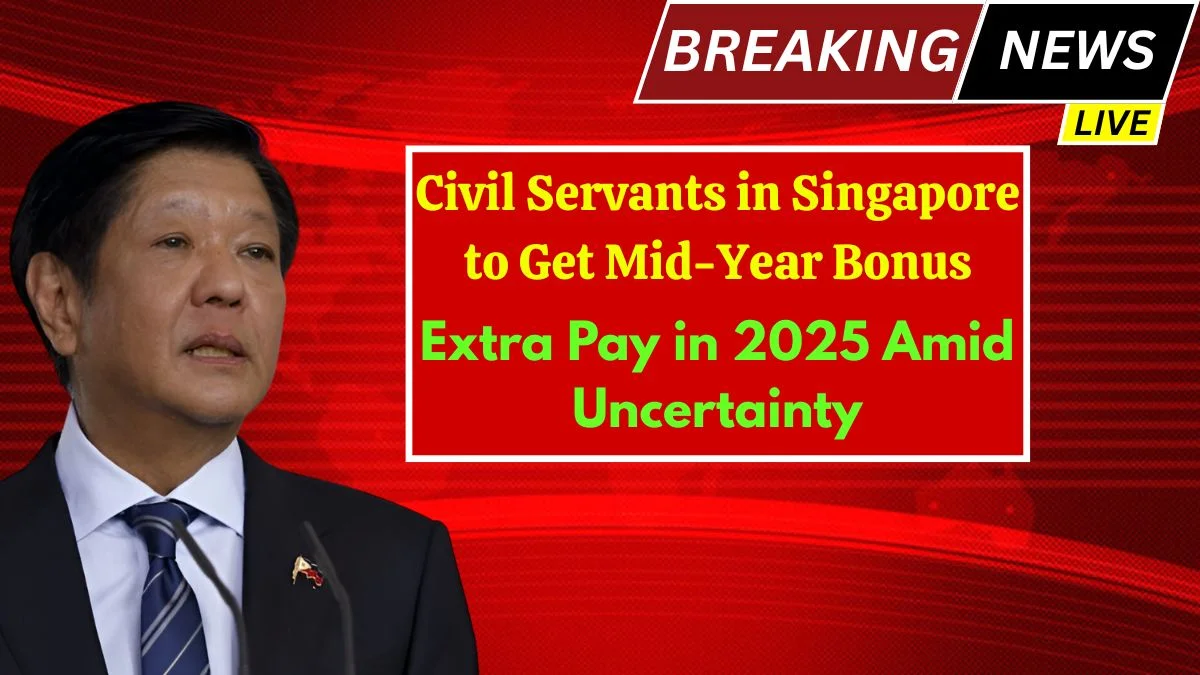The Singapore government has announced it will give 0.4 months’ salary as a mid-year bonus to its civil servants in the year 2025. The announcement was made public by the Public Service Division (PSD) on June 16. This bonus is an important decision taken amid the economic slowdown and global uncertainties, which not only reflects the economic condition of the government but also makes it clear that the government is sensitive to the economic well-being of its employees. Apart from this bonus, low-paid employees will also be given an additional one-time cash payment, up to a maximum of $400. The move is aimed at particularly supporting those government employees who may be most affected due to economic pressure.
Government policy strikes a balance in the era of recession.
The Public Service Division said that this bonus has been decided after a comprehensive assessment of the country’s economic conditions. Singapore’s economy saw a growth of 3.9% in the first quarter of the year 2025, which is a positive sign amid the global economic slowdown. However, for the remaining part of the year, the Ministry of Trade and Industry has projected GDP growth to be limited to between 0% and 2%, which makes it clear that the country has still not fully reached a state of economic stability. In this context, this bonus given by PSD is not only given keeping the economic situation in mind, but it is also a meaningful step towards social justice.
Additional cash payment for lower-grade government employees
This time the bonus is not just a normal payment. PSD has also ensured that employees who fall in the lower grades and whose economic condition is relatively weak are given more relief. Therefore, officers of MX13 (I) and MX14 grades will be given a one-time cash payment of $250, while employees under MX15, MX16 and the Operations Support Scheme will receive an additional payment of $400. This decision shows that the government makes policies keeping in mind every category of its employees and provides assistance according to their needs. This also indicates that not only high-level officials but also employees working at the ground level are being given equal importance.
Decision taken after talks with unions
This decision is not only a government plan but also a process of in-depth consultation with the employees’ unions. PSD, along with NTUC, i.e., the National Trades Union Congress and other government employee unions, ensured that this decision was balanced and equitable. This process proves that Singapore’s administrative structure is based on dialogue, participation and transparency. NTUC has called this decision ‘moderated and balanced,’ which reflects a positive attitude of the government towards helping employees in today’s economic conditions.
Slow pace in the labor market, but a vigilant eye is maintained.
According to data from Singapore’s Ministry of Manpower, some slowdown has been seen in the labor market. The pace of employment growth has declined and the unemployment rate has also seen a slight increase since December 2024. This is the result of global economic instability, supply chain challenges and changes in business outlook. Given these circumstances, the government’s decision becomes even more important as it not only secures the income of employees but also gives them a sense of stability. This alert and proactive approach of the government shows that it is not limited to figures but is also keeping an eye on social signals.
The decision on future bonuses will be based on economic performance.
PSD has made it clear that the decision on bonuses and payments to be given at the end of the year will be taken keeping in mind the economic situation at that time and the needs of the employees. The government and the unions will continue to assess the country’s economy throughout the year and decide on the basis of how much and in what form to give to the employees. This method reflects a flexible and responsible policy in which changes are possible as per the need. This approach makes the government payment system more responsive, transparent and sensitive.
NTUC emphasizes employee inclusiveness and preparedness.
NTUC Deputy Secretary-General Cham Hui Fong said the bonus scheme is not just a financial relief but also essential for employee inclusiveness and mental balance. She also said that in today’s times, companies should communicate openly with employees and unions to form a shared vision about technological changes, business strategies and workforce planning. Older employees in particular may find it difficult to adjust to changes, so NTUC is working towards providing them with training and guidance. This reflects a sense of social responsibility and preparedness.
Government policy: A perfect balance of stability and support
This mid-year bonus reflects a very big policy principle—the government’s commitment to stand with its employees through every situation. The government is ready to provide whatever support is necessary according to the economic data, but it is also committed to maintaining financial discipline. Maintaining this balance is a big challenge, but a nation like Singapore has proven time and again that it can handle this challenge efficiently.
Conclusion:
This mid-year bonus and additional cash payment for the year 2025 are a result of the vision, wisdom and humane approach of the Singapore government. It shows that the government is not just an administrative body but an institution that is vigilant about protecting the interests of its citizens, especially its employees. Through this policy, the government is sending a message that no matter how difficult the situation is, it stands with its employees—financially, morally and socially.
